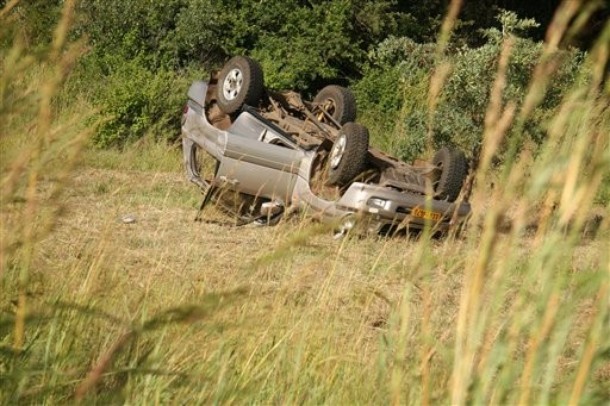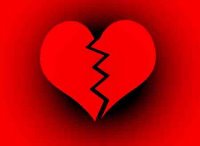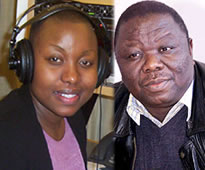The Minister for Trade (Mr. Ian McCartney): With permission, Mr. Speaker, I wish to make a statement on Zimbabwe. I hope that the hon. Member for Cotswold (Mr. Clifton-Brown) and the Liberal Democrats received a copy in good time.
As the Prime Minister told the House last Wednesday, what is happening in Zimbabwe is appalling, disgraceful and utterly tragic for its people.
My noble Friend Lord Triesman, Minister responsible for Africa, noted on 12 March that it was a direct consequence of Mugabe's own approach and of his disregard for the suffering of ordinary Zimbabweans.
What we are seeing is a wilful waste of Zimbabwe's assets and potential by a ZANU-PF Government who have substituted plunder and corruption for a programme of economic and social advancement for its people.
Hunger and malnutrition are all that millions of Zimbabweans now experience in their daily lives, and Mugabe and his regime are directly responsible.
They are directly responsible for Zimbabwe's economy being in free fall: the economy shrank by 40 per cent. in less than a decade, and will shrink by a further 5 per cent. this year. Inflation is already at 3,000 per cent and the International Monetary Fund says that it will breach 5,000 per cent. by the end of this year.
They are directly responsible for circumstances in which a quarter of the resident population is dependent on food aid, and a quarter has already fled the country. They are directly responsible for an unemployment rate of over 80 per cent., the third highest in the world.
It is little wonder that there has been an exodus over the Limpopo river. They are directly responsible for Zimbabwe's having the world's highest orphan rate, largely as a consequence of the pandemic rate of AIDS: roughly 20 per cent. of adults are infected.
They are directly responsible for circumstances in which Zimbabweans can expect to die younger than anyone else on the planet.
A Zimbabwean woman today can expect to live to just 34, while a Zimbabwean man can expect to live to 37. However, instead of taking the necessary measures to reverse each of those evolving tragedies, the regime continues to make people homeless, suppress independent media, harass human rights defenders and arbitrarily arrest those involved in peaceful demonstrations.
The violence and repression used against peaceful protesters gathering to pray for change during the weekend of 10–11 March, during which at least one young person was shot and killed, has continued unabated.
Four members of the opposition Movement for Democratic Change have been prevented from leaving Zimbabwe, including one MP, Nelson Chamisa, who was badly beaten when travelling to a meeting in Brussels. I am pleased to note that the MDC's vice-president was able to take his place: we salute his bravery and that of his colleagues.
A significant number of activists are still being arrested and beaten throughout Zimbabwe. Lawyers representing those who have been detained have themselves faced intimidation.
Trade union and student union members have also been harassed and arrested. My noble Friend Lord Triesman summoned the Zimbabwean ambassador to register our disgust,
As I did during my address to the Human Rights Council on 13 March, I send my deepest condolences to the families and friends of those killed and injured in the last two weeks of terrible assault, and offer my solidarity to all Zimbabweans on behalf of everyone in the House.
Mugabe's men might break the bones of the democracy campaigners, but they cannot break the quiet dignity of these extraordinary human beings. One day, Zimbabwe will return to democracy; Zimbabweans will be free. Mugabe knows that. He knows that he has got it wrong, and that the crisis has resulted in an increase in internal pressure.
He feels more vulnerable. The involvement of the military in almost all aspects of Zimbabwe life—from running state businesses and economic programmes to agriculture and food distribution—underlines that.
What does Mugabe do? He blames everyone else, especially us in the United Kingdom. He persistently alleges that the UK is responsible for Zimbabwe's woes—that we are somehow victimising him for his disastrous fast-track land reform policies.
That is simply not true. We have always recognised the need for an equitable redistribution of land, but that has to be done in a transparent, legal manner. We signed up to all three of the internationally recognised land reform packages: in 1979, 1998 and 2001.
The UK gave a total of £44 million to the first of them. About £3 million was returned unspent in the mid-1990s when the Zimbabwean Government lost interest in proper land reform. We were also willing to support the package put together by the United Nations Development Programme in 2001, but Mugabe's violent land invasions put a halt to that.
Let us look for a moment at Mugabe's claims that the crisis is down to us. It was his Government—not the UK—who displaced and destroyed the homes and livelihoods of, 700,000 people during Operation Murambatsvina, which I understand means "drive out the filth". It is the Government of Zimbabwe—not the UK—who previously refused to appeal to the UN for food aid despite widely reported food shortages. It is the Government of Zimbabwe—not the UK—who have crushed a free media. It is the Government of Zimbabwe—not the UK—who deny Zimbabweans their basic rights of freedom of expression and assembly by routinely and violently breaking up peaceful protests. It is the Government of Zimbabwe—not the UK—who have ignored IMF recommendations to reform an imploding economy.
It is they who continue to squander the country's limited foreign exchange while ordinary Zimbabweans can scarcely afford food.
It is the Government of Zimbabwe—not the UK—who destroyed property rights by removing land from the legal process. It is they—not the UK—who have ruined the Zimbabwean agricultural sector; agricultural productivity has fallen by a staggering 80 per cent. since 1998.
Since 2000, more than 250,000 black commercial farm workers have lost their livelihoods. Including families, that means that there has been a rural displacement of about 1 million people, to match the urban dislocation of 700,000. Of course, while the Government of Zimbabwe continue to blame the international community, the European Union and the UK Government for their troubles, in each case we are taking action to improve life on the ground for ordinary Zimbabweans.
As my right hon. Friend the Foreign Secretary said last week, there is considerable concern throughout the international community about the situation in Zimbabwe.
The United Kingdom is greatly concerned about the situation there, but those concerns are shared by the whole of the European Union, by the African Union—sadly, those concerns have not always been expressed as loudly as they might be—by the United Nations and by the rest of the international community.
Ministers and officials are in constant contact with our African counterparts, emphasising the risks to regional stability and the importance of Zimbabwe's African neighbours taking a more direct role in addressing the crisis in Zimbabwe.
The Prime Minister last week wrote to President Mbeki and spoke with President Kikwete of Tanzania on this issue. We recognise the difficulties in challenging Mugabe bilaterally, but without the engagement of the Southern African Development Community, with its commitment to promoting good governance and respect for human rights and the rule of law, the situation will deteriorate further.
We therefore welcome the visit of the chair of the SADC Organ on Politics, Defence and Security, President Kikwete, to Harare on 15 March.
With President Mbeki of South Africa, he has proposed an initiative to encourage internal dialogue between ZANU-PF and the Movement for Democratic Change on policy reform, but quick progress is necessary if that is to have an impact.
Mugabe is a master of denial and delay. The Zambian President has recently called Zimbabwe a "sinking Titanic"—an apt description, indeed.
On the European Union, despite the claims of Mugabe about illegal economic sanctions imposed by the EU, let us be clear: the EU has no economic sanctions against Zimbabwe.
They exist only in his mind. The EU does not prevent western companies, including British ones, from doing business with Zimbabwe, which in fact has a trade surplus with the UK. The EU does have an arms sales ban, and a travel ban and an assets freeze on leading members of the regime.
While those targeted measures have had no impact on the Zimbabwean economy, they show that the EU is serious about human rights.
Zimbabwean civil society organisations support those measures because they are focused on the destroyers of Zimbabwean society and not on its suffering people.
As my right hon. Friend the Foreign Secretary told the House on Tuesday and the Prime Minister repeated the next day, we will look to add to these targeted measures. We are pushing for, and expect there to be, progress on the addition of extra names to the EU visa ban list, again pressurising the regime without impacting on ordinary Zimbabweans.
On the actions of the UK Government, let the House be clear: we are doing all that we can to relieve the suffering of the Zimbabwean people. T
he UK is one of the three largest donors to Zimbabwe, and, contrary to the claims of some, that money is making a real difference to the lives of ordinary people in Zimbabwe. For some, that money is quite literally the difference between life and death, and the House should be proud of that contribution.
In the past five years, the Department for International Development has committed more than £143 million to humanitarian programmes, including food aid, life-saving vaccines, support for orphans and vulnerable children, and agricultural inputs to the poorest farmers.
We have also provided £37 million to tackle the HIV/AIDS pandemic. Of the €200 million given by the EU last year, the UK alone disbursed nearly €60 million in bilateral assistance—hardly the actions of a country not interested in the affairs of Zimbabwe; far less one with a bilateral grievance.
As the Foreign Secretary made clear on Tuesday, our aid is channelled through United Nations and NGO agencies to escape the clutches of the regime.
I want to stress that our food aid is not a part of the ZANU-PF programme to use food as a means to force support or to punish opposition.
It is also clear that not only are innocent Zimbabweans suffering, but the tragedy in Zimbabwe is having a significant impact on the region: both a direct impact with mass migration, and a consequent social impact in terms of HIV, malnutrition, safety and the education of children, to name but a few factors. As Zimbabwe disintegrates, those impacts will increase.
The UK shares the region's desire to see Zimbabwe's recovery—there is no other UK agenda.
Our concerns are for the ordinary Zimbabweans and their suffering at the hands of a regime determined to pursue policies that hurt rather than help them. We stand ready to help, with our international partners, but only when there is an environment inside Zimbabwe in which that assistance will be effective.
Until the Zimbabwean regime changes course, we will maintain the international spotlight on them, and increase Mugabe's isolation.
In that vein, I welcome France's decision not to invite Mugabe to the February France-Africa summit, which sent a clear signal that this woeful governance will not be tolerated.
However, as I and others, including the Prime Minister, have made clear, the Zimbabwean crisis cannot be solved by the UK. Those sentiments were echoed by the opposition leader, Morgan Tsvangirai, who told the BBC on 18 March:
"I have repeatedly said that the British government cannot be seen to be at the forefront in confronting Robert Mugabe alone. I've always said that that will be misconstrued as a colonial resuscitation of the same situation again. So I always say that Britain, together with the rest of the international community, the African Union, and the rest of the international community have to act together."
So we in this House and elsewhere must be careful that, while expressing our outrage at recent events and at the downward spiral of Zimbabwe, we do not do or say anything that will hand a propaganda tool to Robert Mugabe.
We will continue to exert pressure in international forums, including the United Nations—we expect a tough EU statement on the Human Rights Council this week, and a humanitarian briefing on the UN Security Council next week—the African Union and the European Union, and with international partners, until democracy is restored to Zimbabwe.
We will continue to do everything that we can to ensure that whoever governs Zimbabwe does so in a way that guarantees a better future for all Zimbabweans: a democratic and accountable Government, and policies that ensure economic stability and development, not humanitarian misery.
My generation was the first to be born not as children of the empire, but as children of the Commonwealth.
When I first became involved in political life, the struggle against colonialism, and the struggle of the peoples in southern Africa who were subjugated by racist regimes, were an inspiration to me and to my generation. As time went by, we celebrated as Rhodesia became Zimbabwe and the fighters came out of the bush to create a new democratic future for their people.
That is why it is so hard for me personally to watch what is happening in Zimbabwe today. Uniquely, the people whom we once cheered as liberators are now the oppressors who have taken away the voice of the Zimbabwean people.
Brave Zimbabweans are speaking up for their freedom. They are looking to their African neighbours to help. We are playing our part in the international community.
In 1980, Zimbabwe proudly proclaimed its independence. Tragically, 27 years later, its people have still to gain their freedom.
New Yahoo! Mail is the ultimate force in competitive emailing. Find out more at the
. Plus: play games and win prizes.


























No comments:
Post a Comment